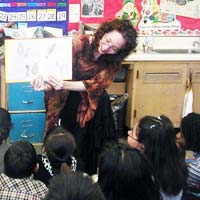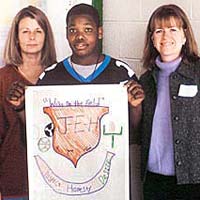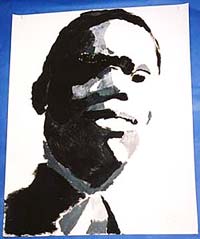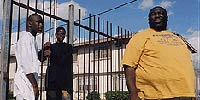What Teachers Make: Mali
A video of a poem by Taylor Mali (who’s been on HV several times), “What Teachers Make :”
via Ben- Comma Q.
A video of a poem by Taylor Mali (who’s been on HV several times), “What Teachers Make :”
via Ben- Comma Q.
Past, present, and future POVs of time, thru the lens of a Philip Zimbardo lecture, and the art of RSAnimate:
The Secret Powers of Time
RSA is the (deep breath) Royal Society for the Encouragement of Arts, Manufactures and Commerce. They’ve been animating excerpts from their series of talks. Nary a note on who the artist is, tho, but it seems these whiteboard wonders are from Cognitive Media.
‘Nother RSAnimation worth checking: “Drive: The surprising truth about what motivates us” (talk by Dan Pink).
 The Knight Digital Media Center (UC-Berk J Skool) offers a suite of Tutorials. Among them: Macintosh OS X—Getting Started, FTP Made Simple, and lots more in their Audio category.
The Knight Digital Media Center (UC-Berk J Skool) offers a suite of Tutorials. Among them: Macintosh OS X—Getting Started, FTP Made Simple, and lots more in their Audio category.
Another video on the info-age from Prof Wesch and the students of Digital Ethnography (@ KS State U). How do they do it? Their shots are always so simple and sparse, their writing terse, but sequentially, in a series of small insights, they build into something beautiful and moving. “A Vision of Students Today:”
via Robert Paterson.

![]() Hearing Voices from NPR®
Hearing Voices from NPR®
061 Educating Esme: A Teacher’s Diary
Host: Alex Chadwick of Interviews 50 Cents
Airs week of: 2009-6-10
“Educating Esme” (52:00 mp3):
During her first year teaching fifth grade in a Chicago public school, Esmé Codell kept a journal. This radio hour is based on her book Educating Esmé: Diary of a Teacher’s First Year. Produced by Jay Allison with Christina Egloff for their Life Stories series and Chicago Public Radio. (This version is slightly edited for time; the original is at PRX.)
Esmé Raji Codell: Planet Esme | Blog | Amazon | Audible | WBEZ 848 | LOC Webcast.

Photo by Katie Davis:
Jesse Jean with Teri and Toni.
![]() Hearing Voices from NPR®
Hearing Voices from NPR®
060 Getting Out: The Education of Jesse Jean
Host: Katie Davis of Neighborhood Stories
Airs week of: 2010-05-05 (Originally: 2009-06-03)
Getting Out: The Education of Jesse Jean (52:00 mp3):
Go to school, keep your grades up, go to college. That’s what we tell kids — over and over. What if just leaving your apartment, and walking up the block is risky? What if it feels safer to stay home, play video games, keep a low profile. When you do go out, head somewhere safe, like the teen center, the basketball court. That was the world of African American teenager, Jesse Jean.

Jesse lived a half a block from host Katie Davis in their Washington DC neighborhood. He was lucky enough to get a scholarship to a private boarding school and brave enough to take it. Katie kept in touch with Jesse, as he moved into this new world. We hear three stories covering seven years, starting in summer, 2001.
Jesse’s Stories on NPR: 2002 Turning the Corner (photos) | 2004 Beyond Myself (photos) | 2008 An Urban Teen Beats The Odds.
 While catching up on SALTcast‘s, I caught this gem, a radio story about silence at Quaker meetings, “Silence Among Friends” by Joni Murphy (12:07 mp3):
While catching up on SALTcast‘s, I caught this gem, a radio story about silence at Quaker meetings, “Silence Among Friends” by Joni Murphy (12:07 mp3):
SALTcast is the podcast of the SALT Institute for Doc Studies (w/ PRX help). Each cast contains an audio story, accompanied by an appropos nugget of journalistic insight from SALT radio instructor Rob Rosenthal. Listen weekly and you’ve got yourself the equivalent of an online J-Skool degree.
What we know now in the USA, India and China, and what we will know soon. “Did You Know?” by shifthappens:
via Gravity Medium.

![]() Hearing Voices from NPR®
Hearing Voices from NPR®
029 Old School: Back-to-School Special
Host: Katie Davis of Neighborhood Stories
Airs week of: 2012-06-06 (Originally: 2008-09-17)
Old School (53:00 mp3):
Richard Paul follows “School VP,” Asst. Principal Irasema Salcido, through her hectic multi-lingual morning at DC’s Bell Multicultural High School.
Host Katie Davis finds she “Got Carried.”
Slam poet and history teacher Taylor Mali schools us on “What Teachers Make” (CD: Conviction | video.)
Producer Hillary Frank gets the shy “Quiet Kids” to speak up.
Chicago Tribune columnist Mary Schmich‘s commencement speech advises “Everybody’s Free (To Wear Sunscreen),” with music from filmmaker Baz Luhrman (CD: Something For Everybody), performed by actor Lee Perry, sung by Quindon Tarver).
Host Katie Davis takes her DC summer camp into the wild woods on a “Hike to Rock Creek,” two blocks from where the kids live.
And more poems: Meryn Cadell “The Sweater” Angel Food for Thought (video), Jelani “By The Numbers” Angel Food for Thought., and Taylor Mali “Seventh Grade Viking Warrior” Conviction.
Music: Jurassic 5 “Lesson 6: The Lecture” Jurassic 5 EP, Archie Moore’s “Times Table’ With Soul and a Beat” from WFMU Blog- 365 Days Project, Lanterna “Fields” Sands, Sam Cooke “Wonderful World” Greatest Hits.
Baz Luhrmann – Everybody’s Free (To Wear Sunscreen)
They’re already into Season 2, but if you can’t keep up, go back to the basics, My Damn Channel You Suck at Photoshop #1:
Some background from Laughing Squid:
Josh Quittner recently wrote an article for Time, “The Photoshop Guys Revealed!†unmasking the creators of the enormously popular and hilarious Photoshop tutorials “You Suck At Photoshopâ€. The 10 episode series (Season 1) on My Damn Channel was created by Matt Bledsoe and Troy Hitch (Troy does the voice of Donnie) of the creative agency Big Fat Brain, who designed the My Damn Channel website and are the guys behind the series “Tim after Timâ€.
We’ve updated and link-checked our list of tools, talks, guides and other online radio how-to’s: HV Learn Radio- Links.
Some online J-school tools…
Visual Edge is a premiere multi-media workshop for photojournalists it provides a list of lessons (pdf) for media journalists:
- Sound in the story: Balancing the tools in new-media journalism
“More and more journalists are working with audio these days and learning from radio reporters. This is a fabulous guide for journalists about using sound and audio clips in their journalism. It’s a 21-page PDF with lots of good advice about story development, writing, and gathering sound. The best part of this guide is the extensive advice about interviewing. The guide was prepared by J.Carl Ganter and Eileen E. Ganter for the Poynter Institute for Media Studies. They give credit for some of the content to David Candow, a well-known broadcast trainer for CBC.”
- Microphones: Two main types
Poynter Online hosts an online resource list of informational links on anything imaginable in field media journalism.
The Canadian Journalism Project is a collection of all things journalism. There’s advice and articles on social nets, web-searching, and beat-specific tools, along with an award-winning journalism database, ethical resources and links for teaching.
The International Women’s Media Foundation’s Online Training has these “Tips & Guides: Writing Broadcast,” of which educator Mary McGuire says, “There are countless guides to writing broadcast copy online. This is one of the better ones. It’s a clear list of 10 rules with good examples as illustrations.”:
Did I write in my own voice or did I use the words of a wire service or officials?
Did I eliminate unnecessary information?
Did I leave any unanswered questions?
Translate the jargon. Make the words your own.
 This week’s HV cast — When the last school bell rings, Pastor Mike Cummings stands in front of Jordan High School in Watts, Los Angeles. Jordan High is next door to the gang-ridden Jordan Downs projects, which students have to pass through to go home — sometimes with Pastor Mike at their side. A story by Queena Kim, “Pastor Mike at Jordan High” (3:22 mp3):
This week’s HV cast — When the last school bell rings, Pastor Mike Cummings stands in front of Jordan High School in Watts, Los Angeles. Jordan High is next door to the gang-ridden Jordan Downs projects, which students have to pass through to go home — sometimes with Pastor Mike at their side. A story by Queena Kim, “Pastor Mike at Jordan High” (3:22 mp3):
 Just getting started is this WikiRecording, an audio-recording community knowledge-base. The contents are a bit skimpy as yet, but some sections, like “Stereo Microphone Techniques” are filling out. And maybe with all our help…
Just getting started is this WikiRecording, an audio-recording community knowledge-base. The contents are a bit skimpy as yet, but some sections, like “Stereo Microphone Techniques” are filling out. And maybe with all our help…
The Knight Citizen News Network has just published Journalism 2.0: How to Survive and Thrive, A digital literacy guide for the information age. Available as a free pdf or $10 dead-tree vers. The book fears not the feature; the chapters flow from “Digital Audio and Podcasting” and “How to Report News for the Web” to “FTP, MB, RSS, oh My!” (did you know a YottaByte is 1,208,925,819,614,629,174,706,176 bytes, page 17) and even “How to Blog.”
via PRX Jake.
![[ How Toons ]](/news/wp-content/uploads/2007/08/diy.jpg) Digg turned this up today:
Digg turned this up today:
a collection of science- and engineering-related web comics.
I’m a bit partial to the form, my long-standing affair probably started about the time I got my first Dr. Seuss book. This struck me as particularly infectious — possibly because I’ve been re-immersing myself lately: novelized pastiches such as geoffrey woods’ Leaper and Austin Grossman’s Soon I Will Be Invincible; Moore and Gibson’s The Watchmen, Alex Ross and Mark Waid’s Kingdom Come, Frank Miller’s irrepressible Dark Knight and nearly everything Brian Woods has done; films such as Unbreakable, Sin City, Superman Returns, Batman Begins, and, of course Heroes.
What impresses me most, I suppose, is the resilience and versatility — how and why comics have persisted…
From Current TV, a four-part vid by TAL’s Ira Glass on Storytelling.
On the basics…
On finding great stories…
On great taste…
On two common pitfalls…
via Gregg McVicar- Undercurrents.
If I ever hear someone say the trite expression, “Think outside the box” I immediately think: Only a person who can’t think outside the box in the first place would utter such a thing. But this now, kind reader, is something entirely different and even amusing so check out this page.
 Inside the newly released iTunes 7.3 is an online University. iTunes U, sez Apple, is “giving higher education institutions an ingenious way to get audio and video content out to their students.” Already a dozen colleges offer course materials and podcasts via this new feature inside iTunes Store (link launches iTunes). Find out about “The Future of the Internet” (iTunes) from Stanford University, view the virgin “Mary in Folk Art and Belief” (iTunes) at Otis College of Art and Design, or figure out “Physics for Future Presidents” from UC Berkeley
Inside the newly released iTunes 7.3 is an online University. iTunes U, sez Apple, is “giving higher education institutions an ingenious way to get audio and video content out to their students.” Already a dozen colleges offer course materials and podcasts via this new feature inside iTunes Store (link launches iTunes). Find out about “The Future of the Internet” (iTunes) from Stanford University, view the virgin “Mary in Folk Art and Belief” (iTunes) at Otis College of Art and Design, or figure out “Physics for Future Presidents” from UC Berkeley
 Free online Journalism Training course from News University, taught by the NY Times multimedia editor: Telling Stories with Sound.
Free online Journalism Training course from News University, taught by the NY Times multimedia editor: Telling Stories with Sound.